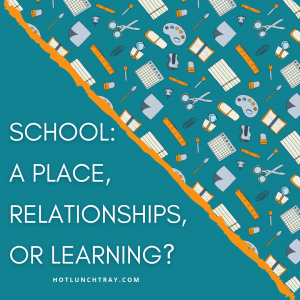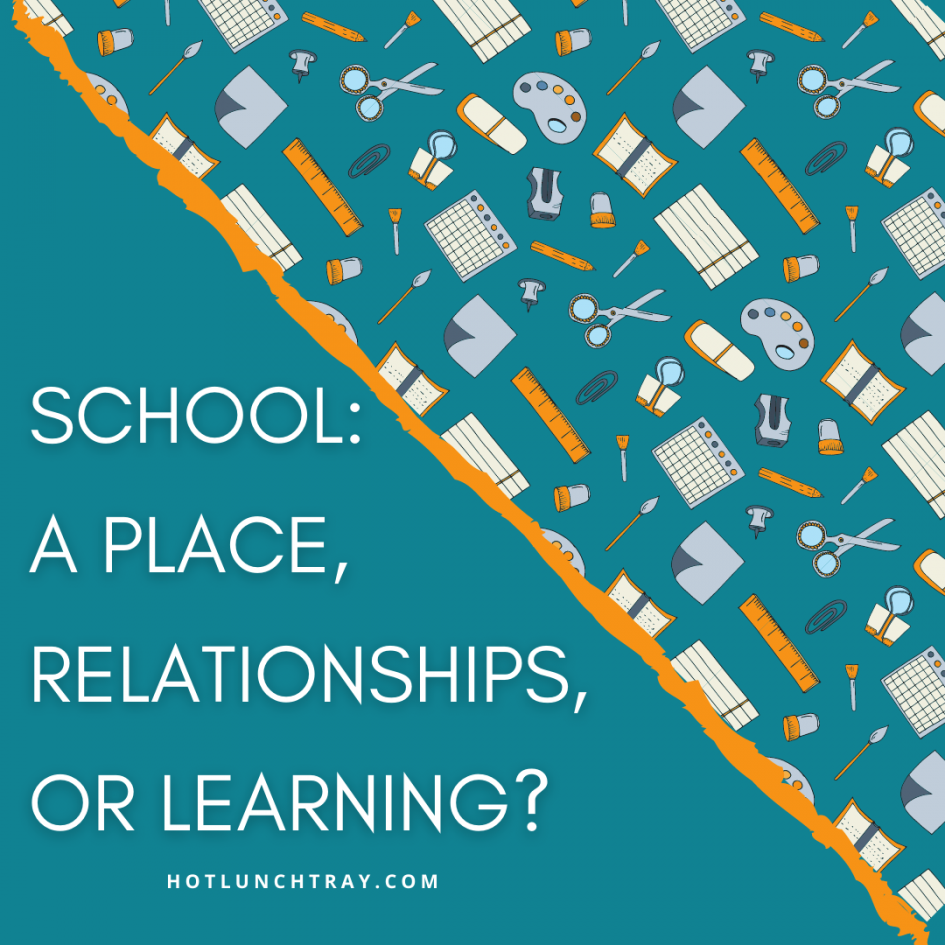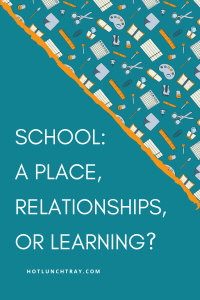Many communities have been out of the school building since mid-March of 2020. As we approach winter 2020 people are reminiscing about “school.” Is school a place, relationships, or learning?
What does school mean to people? Are all stakeholders reminiscing for the same thing? Could this be an opportunity to define what school is moving forward?
A Place
Many teachers who felt heroic last spring were cut to the quick when they perceived their safety in question as authorities sought to re-open school buildings. Some states questioned if teachers should be categorized as essential in order to re-open schools. And teachers had a hard fact to face, that many in their community viewed them as custodial.
Because of the schedules, grade levels, and building layouts the school day is teacher-centric. Typically students travel to and from teachers; teachers are largely stationary and students move to them. Teachers, in 6-12 especially, specialize in content while students generalize and must follow roughly the same program (maybe with caveats of teacher-differences in how they are awarded cedit for learning).
Classrooms are spaces designed by teachers to amplify face to face instructional practices. Current teacher stress is a result of many teachers not able to rely on their standard instructional practices: lecture, physical attendance, circulating the room. Which are all based on mandatory attendance.
Lectures are not compulsory for remote students with a choice. Teachers need to honor a student’s time with asynchronous options that don’t require only the teacher to speak, but provide intellectually challenging work to engage in. The teacher cannot be the focus of learning with so much else happening. (In order for teachers to expertly facilitate this learning they would need access to flexible, quality online content: (future related post).
Teachers compete with various claims to student attention: home entertainment (video games/Internet/streaming services), poor/no Internet, lack of supervision, hunger, the need to work, alongside a pandemic. Much of that competition would be eliminated if students were at School The Place, but others would not. How many students would rather be entertained by videos and games than be at school? Likely a high number. And how much hunger and lack of supervision could we address if we were all together at school? Likely a good amount. Be prepared. School The Place will be questioned as a necessity after this pandemic.

Relationships
Postivie relationships are important to the teacher-student relationship. Teacher’s cannot carry student’s learning on their back via relationships however. And the relationship should be one which encourages each party to do their best.
Many teachers have difficulty deciding how much grade level content to set aside to engage in Social-emtional learning (SEL) activities or lessons in either a face-to-face or an online environment. Such activities or lessons may not be important to all learners; some learners have SEL support in their homes. The question of whether to explicitly teach SEL is an example for the application of a student-centered approach. For those who already have the needed SEL skills to survive in a remote learning setting any SEL activity or lesson may not result in better learning outcomes, but for select students those activies/lessons can be a positive contribution to their learning capacity.
Students
While direct instruction for students on social-emotional learning skills is not specific to remote or face to face learning Abali and Yazici (2020) found listening skills were a positive predictor of strong SEL tendencies. Students can focus on developing their listening skills to bolster their future SEL needs.
Parents
Parents need basic instruction, modeling, or a list of things to look for when it comes to the new access students experience while learning outside fo school. Supervision needs to be more than working in the same room and parents will need tips from educators on how to incorporate the best of classroom management skills to their kitchen table (Sheninger, 2020) .
Teachers
Teachers should explicitly teach listening skills which can support future SEL initiatives or needs (Abali & Yazici, 2020). Teachers can also educate themselves not he available SEL activities / lessons which support the wide variety of their learners. The willingness to meet individual students where they are in their SEL capabilities will pay dividends in student clasrrom interaction and simultaneously offer a level of student-centric learning which may not have previously been experienced by the learner or teacher.
Learning
Teachers talk about teaching online, but who is learning online? In order to engage students in online learning, the learning requires a student-centric shift.
A good way to envision this is to imagine students progressing through content at their own pace. Much the same way a teacher might say, “my second period is taking longer to get density,” teachers should expect all students to have similar nuances at the intersection of content and time to learn.
Teacher-centric classrooms are based on the time it takes the teacher to teach the curriculum, not how long each learner takes to learn the curriculum. Video games are very learner-centric; many video games immerse the player in context, provide immediate reinforcement, and allow unlimited retries. Students are excited about those things and while that content level may not be available to all teachers (future related post), small instructional shifts toward learner-centric classrooms can render increased engagement.
As we listen to non-educators lament a closed school, let’s strive to clarify what school is. Can we offer “school” online or only in-person? What expereicnes do people have of the current mode that is the same as when students are in-person – and what does that mean for the question of “What is School?”
References
Abali, B. Y., & Yazici, H. (2020). An Evaluation on Determining the Relation between Listening Skill and Social Emotional Learning Skill. Eurasian Journal of Educational Research (EJER), 89, 71–91. https://doi.org/10.14689/ejer.2020.89.4
Sheninger, E. (2020). Remote Attention to Social-Emotional Needs. School Administrator, 77(11), 1–3.







1 Pingback